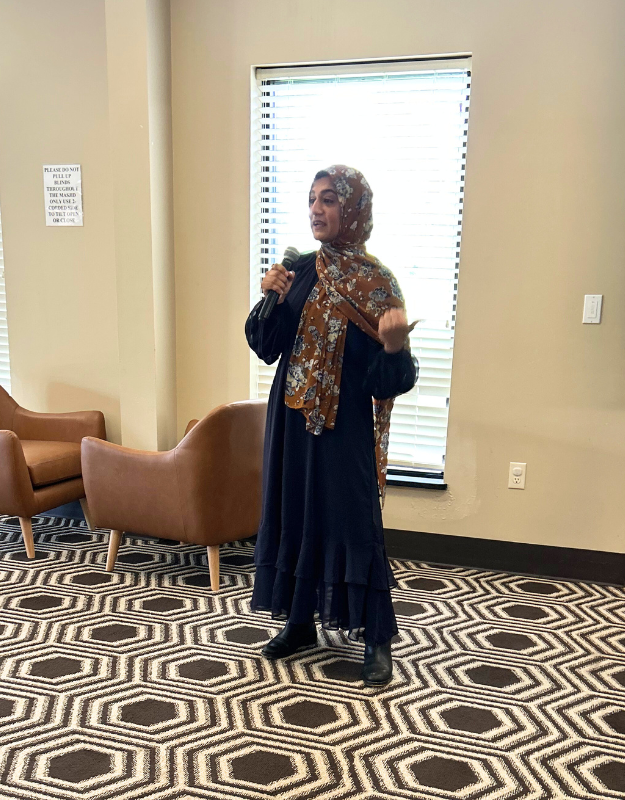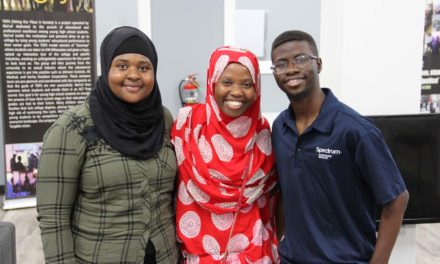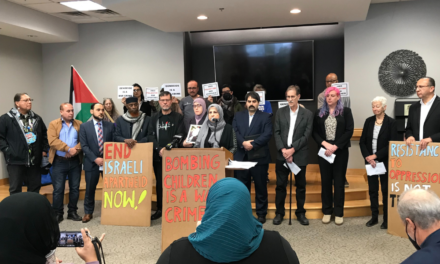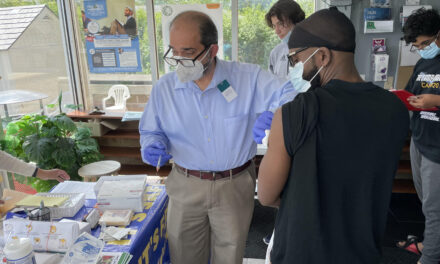
Psychologist and Islamic scholar Imam Ahmad Deeb, Ph.D., included a weekend in Milwaukee on a six-week U.S. speaking tour. He lives in Damascus, Syria.
“I’m going to tell you a story,” visiting speaker Imam Ahmad Deeb told a group of more than 60 people gathered Saturday morning at the Islamic Society of Milwaukee—Brookfield for his workshop, Beyond Mental Health: Holistic Well-Being From the Qur’an and Sunnah.
“My grandfather is 105. I mention that a lot because it is insane. He is mentally sharper than me,” said Imam Deeb, who is in his early thirties. “I can’t get away with anything. He notices it all. He’s ten steps ahead.”
“What’s the secret?” Imad Katib, M.D., of Brookfield asked.
“We’ll get to that. What we are going to learn today is the secret.”
In what was scheduled to be a three-hour workshop but, with the audience’s enthusiastic consent, became a five-hour one, Imam Deeb talked about “prophet living,” a holistic lifestyle that fosters well-being, modeled by Prophet Muhammad (pbuh).

About 65 people attended at Saturday seminar at ISM-Brookfield on holistic wellbeing, given by Imam Ahmad Deeb, Ph.D.
As Imam Deeb paced the front of the hall, dropping book references, helpful tools and light-hearted banter. The young but accomplished imam drew on lessons from his studies and career. He has a doctorate in psychology, a master’s degree in Islamic Studies and Leadership, a bachelor’s degree in psychology and an associate’s degree in religious studies.
He served as the imam and director of religious affairs at Islamic Center of Greater Toledo from 2019-2022 and co-founded Pillars Seminary in 2022, where he also teaches. (Pillars Seminary is a non-profit organization that specializes in Fard al-‘Ayn education, a concept that means “individual obligation,” a study of the topics within Islam every Muslim is required to know and practice.)
He recently moved to Syria, where he will work with and learn from his father and grandfather. His father, Shaykh Abdullah Deeb, an imam and teacher of Qur’an since 1982, has studied with some of the greatest scholars of Syria, graduating from Abu Nour Institute in Damascus. He currently holds one of the shortest asanid (chain of transmission to the Prophet for teaching Qur’an) in the world, the Pillars Seminary website states.

Nadia Malik invited Imam Ahmad Deeb to Milwaukee.
In addition to the Saturday seminar, Imam Deeb gave two khutbahs (sermons), a keynote during the Friday night Seerah Program (about lesson’s from Prophet Muhammad’s life) at ISM Main, a Family Night lecture Saturday at ISM-Brookfield about community building and a four-hour class on innovation in Islam for ISM Core Academy, a branch of ISM’s programs for youth and young adults that provides academic, seminary-style classes.
Milwaukee doesn’t have an Islamic seminary but by inviting Islamic scholars and teachers to provide half-day workshops, Milwaukee’s youth “get a taste of what seminary studies are like,” said Tahaa Zuberi, who coordinates ISM Core Academy programs with Imam Ameer Hamza of ISM-Main.
In every speaking engagement over the weekend, Imam Deeb addressed more than 50 people. “Mashallah, he gave so much in each program and, in between, he spent time talking with us,” noted ISM-Brookfield Imam Rami Bleibel. “I went out to lunch and dinner with him,” where he continued sharing ideas and insights.
Lessons in living
Imam Bleibel found the timing of Imam Deeb’s visit fortuitous.
It had been almost a year since Nadia Malik of Wauwatosa, a member of the ISM-Brookfield community and a behavioral health therapist at Aurora Psychiatric Hospital, suggested inviting him to ISM-Brookfield’s Program Committee. She had been his student at Pillars Seminary.
“His background in psychology and community bonds, in addition to his Islamic scholarship, looked beneficial for our community,” Bleibel said. “But he was not available.” In the meantime, Deeb relocated from Ohio to Syria.
Malik reached out to him again and learned he would be in the United States and was available the first weekend in September. “He said he could come and would be at our service all weekend,” Bleibel continued.
“To have him come at the start of the school year brought the community back into the masjid to reconnect. The timing was beautiful! He offered a seminar on holistic life balance at a time when we really need it, when everyone is getting back into the fall routine.
“We live in compartments,” Bleibel explained. “When school and work life pick up, we drop family and spiritual life. Imam Deeb brings the perspective of developing a holistic life with a strong spirit, mind and heart.”
Imam Deeb spoke about the importance of a balanced life, basing his talk on Islamic teachings in the Qur’an and hadith (lessons from the life and teachings of the Prophet to his companions).
“Seek the hereafter by the means Allah has given you but do not forget your share of this world,” he translated from the Qur’an. “Dunia (this time in this world) is the primary bridge to help you attain success in the hereafter.”
The key is balance, he said. “And balance is the natural bi-product of a holistic life. Balance happens when all the ingredients for it are in place.”

Guest imam Ahmad Deeb, Ph.D., (second from left) chatted with participants in ISM-Brookfield’s Saturday seminar. With him are, from left to right, Aziz Aleiou of Brookfield, his student Nadia Malik of Brookfield and Lila Nataliansyaah of Brookfield. Nataliansyah coordinated the logistics of the weekend events at ISM-Brookfield.
He gave examples from hadith that demonstrated one should not pursue personal piety at the expense of helping a friend. (The exception is fulfilling religious obligations, he noted.) “Break your fast so you don’t break someone’s heart.”
He brought another example from life. “I recently wrote on my Substack why being visibly Muslim is important and I am writing to me. Growing up in Orlando, I looked like another Puerto Rican. All my friends were Black and Latino. But, my name was Ahmad so I couldn’t get away with it.
“A community member wanted to name their child John. Nothing is wrong with that. But, I asked, what is the objective? They said, ‘If we name him John, he will be able to fit into society.’ And I said, ‘You don’t want that. The way he looks, he will already fit into white American society. Name him Yahya.” Why? Because there has to be something that forces a negotiation of his identity. Just blending in is not always healthy.
“You need a balanced state of being. Yourself has a right over you. Your body has a right over you. Your family has a right over you. All these things matter.

Taaha Zuberi of Franklin coordinated Imam Ahmad Deeb’s visits to ISM-Main.
“Three relationships impact everything in our lives: our relationship with God, our relationship with creation (nature and humanity) and our relationship with ourselves,” Imam Deeb explained. “Our emotional and mental states make up our psychological wellbeing. Our relationships with others, our social connections, impact them. We are social beings.
“And all of this is spiritual. Eating with people, hanging out with them, joking with them, spending time with family, it’s all spiritual. Going for a run, exercising is a spiritual activity. You are taking care of yourself and that’s the sunnah.
“The greatest investment you can make is not wealth or children but in a sound heart. How do we get to a sound heart? Taking care of every part of us that impacts our heart, making sure our heart is in a state of serenity.”
Taking it to the community level, “how do we create communities where peace is honored and where your heart is at peace? By regulating your emotions. By being in touch with your body. We can’t just think our way out of trauma. We have to deal with it properly.
“If you don’t take care of yourself properly, it will impact your relationship with God and others. If you don’t exercise and don’t go to therapy, you can’t just do more salah (prayer). You can’t just pray your way out of it.” He encouraged the audience to address their needs, physically, mentally, socially and spiritually, without neglecting any aspect.
Some useful tools
Among the many tools Imam Deeb suggested during his talks were:
- Start well. “How you start something will often dictate how it is sustained.” He recommended the book Atomic Habits for guidelines on developing constancy and consistency. “The way you start something is a signal about the importance you give it,” Deeb said.
- Find an “Accountability Buddy. If you are struggling to fulfill some of your objectives there is no better route than to have someone you trust, respect, love and, maybe, fear disappointing to hold you accountable,” he said.
- Develop a morning routine. “How many of you start the day by scrolling your phone? Be intentional. If you begin your day with Fajr prayer, then follow with dhikr (an Islamic form of meditation). Noting “the misconception that to meditate is to copy Hindu practices, he said, “Guided breathing is something we Muslims have been doing for centuries.”
Imam Deeb’s weekend in Milwaukee was a full one, said Taaha Zuberi of Franklin. “Him coming to Milwaukee was such a blessing. The fact that he was able to do so many programs for us back-to-back was crazy for him. We asked, ‘Are you sure?’
“He said, ‘I’ve got this.’ He’s been very accommodating and gracious with us,” Zuberi said. “We certainly took advantage of the opportunity and appreciate him for it.”













